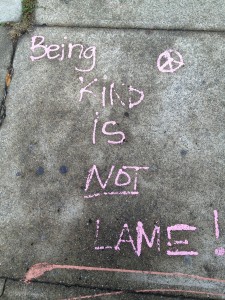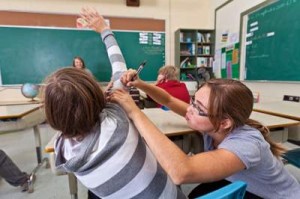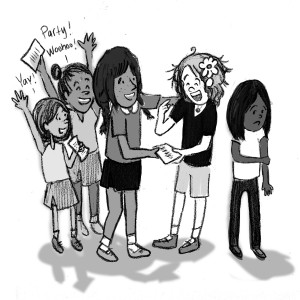|
|
October 1, 2013
October is National Bullying Prevention Month. Not sure what we’re expected to work on for the rest of the year, but I’m up for treating people better, at least through Halloween.
Unlike highly successful education campaigns of the past: Don’t Be a Litter Bug and Buckle Up for Safety because Only You Can Prevent Forest Fires, if you go by surveys, our 10+ year war on bullying hasn’t yet reached the tipping point.
There’s no one solution to verbal abuse and the rest of the social garbage that has become the norm for our kids, online and off. Something’s gotta give and each of us has the power to make things better. I never took physics, but I know that everyday nastiness and social aggression adds to the garbage. So it stands to reason that more kindness and respect will move the needle in the other direction.
That’s why, starting today, to honor the good intentions of National Bullying Prevention Month, I’m beginning my own month-long Kindness and Respect Challenge (aka #KindRespect).
 Kindness and Respect Challenge Here’s the idea: between now and October 31st, I will actively look for opportunities to be kind and respectful to others. I realize it’s going to take serious anger management and mouth control on my part. I also understand I’m inviting the the Universe to throw a whole lot of “tests” my way, but I’m in and I’ll be reporting my experiences right here every day.
Who’s in with me?
In friendship,
Annie
PS Encourage your kids to join the Kindness and Respect Challenge along with you (and the whole family). Create a #KindRespect chart (could be on the fridge or posted on a wall) in which each one of you who RECEIVES an act of kindness and/or a show of respect from another family writes it down. For example, John might write on the chart, “Trevor helped me with my homework.” Way to go, Trevor! Or Trevor might write, “Mom, made me a snack.” Yay, Mom! At the end of the week, acknowledge the cumulative effects of more kindness and respect in the family. Change happens when we change how we treat each other.
Check out Day 2

September 27, 2013
I originally wrote a version of this article for TakePart.com
When it comes to teaching kids to be good people, we parents repeat ourselves… a lot. That’s OK, because young skulls are thick and young minds are often distracted. We continue harping on the rules because we want our kids to act responsibly, even when we’re not around. That’s why it’s so gratifying to hear a good report about our kids from teachers or from other parents. At those times, all a proud mom or dad should do is smile graciously and reply, “That’s so nice to hear.” But what do you do with a negative report from school? That’s what this parent wanted to know:
I just received a dreaded phone call from my nine-year-old’s teacher saying that he is goofing off during class time and not staying focused. How can I show him there are consequences for him acting that way in school?
 I didn't do anything!
Use these tips to discuss out-of-line behavior with your child so s/he gets a clear message yet still feels loved and supported:
1. Get the facts. Before talking with your child, talk with the teacher. Find out exactly what’s going on and how it has been handled so far. Find out if other students are involved. The more information you have for your upcoming discussion with your child, the better.
More: How to Help Your Kids Deal With Peer Conflicts at School
2. Talk with your co-parent. If there are two parents in your child’s life, teaching him or her to do the right thing should involve both of them. Whether you are co-parenting under the same roof or not, getting both parents on the same page adds twice the reinforcement for the course correction your child needs. Being on different pages (or in different books!) sends mixed messages. Suppose one parent says, “Emma, when you’re in class your job is to be the good student I know you can be. That means showing your teacher respect by paying attention.” And the other parent chuckles and says, “Fooling around in class? That’s my girl! I gave my teachers a hard time, too.” Obviously, no responsible parent would ever say that, but you get the idea why staying on message is so important.
3. Talk with your child. Call a family meeting and bring snacks. (Always appreciated) Present the information you have. Stay calm as you ask, “What’s true about your behavior in class?” Your child will likely deny the teacher’s report, to which you might reply, “If it’s not accurate, why do you think s/he said it?” You might hear, “The teacher hates me.” Or “I dunno.” Don’t buy it but don’t lose your cool. Simply put on your Good Cop hate and dig deeper. After some more gentle encouragement in the direction of the truth, your child may walk back the denial. “I might have been fooling around a little, but I wasn’t the only one.” Or, “I’d pay more attention if Mr. __ wasn’t so boring!” These are justifications for bad behavior. Acknowledge them calmly, but don’t invest any money. Simply repeat the question, “What’s true about your behavior in class?” At this point, your child may confess, “I guess sometimes I talk while the teacher is talking.” Now we’re getting somewhere!
4. Help your child take responsibility. We control our own behavior. Sure, other people may influence our choices, but ultimately our decisions (to act out in class, to blow off a homework assignment, to spread a nasty rumor, etc.) are our own. Teach your children well. This one’s an important life lesson.
5. Move forward. Work with your child to create some new strategies for being a more attentive student. That includes new ways to respond to distractions in class, when the focus ought to be on the teacher, or at home, when the focus ought to be on homework.
6. Follow up. Work together to set realistic short-term goals and hold your child accountable. If s/he has been failing to turn in daily homework, set up a goal for the next one to two weeks that all homework will be completed (to the best of his/her ability) and turned in on time. Let your child share his/her progress with you. Acknowledge progress! If you need to, stay on top of things (without hovering).
In all of this, your long-term parenting objective is helping your child understand that negative feedback can provide a valuable opportunity to make positive changes in school and in life.

September 26, 2013
Got an email from Concerned Mom whose smart, funny daughter has no trouble making friends, but lots of trouble keeping them. The pattern is this: Daughter gets close to other girls and feels accepted by them. Then, within weeks new found friends exclude and then ignore the girl. Naturally, she feels upset and alone, which, of course breaks Mom’s heart. She turned to me for advice and here’s what I told her:
I understand that it breaks your heart to see your daughter so unhappy. Of course you want her to make real friends who treat her with affection, kindness and respect. But it feels like something is missing in your email.
Each time your daughter is disappointed by a new friend you’ve listened to her side of the story, sympathized and offered comfort and support. All good! But there are at least two sides to every relationship story. That’s why I am curious about what’s going on from the other girls’ perspectives. Maybe you’re also wondering why each of these new friends turn against your daughter after such a short time? It’s a mystery worth exploring.
What might your daughter be doing (knowingly or unknowingly) to contribute to this reaction she often gets? How about if you ask her: “Why do you think ____ stopped wanting to be your friend?”
This question may bring up a lot of emotion, so please ask it in a neutral tone of voice. You’re not accusing your daughter of anything! You’re simply inviting her to put aside her sadness and think about what may be going on here. Right now, she’s hurt and confused and probably feeling powerless. She can regain some of her power by understanding how she functions in friendships because she plays a significant role in every one of them, whether she’s aware of it yet or not. To encourage her to think about that role you need to ask thoughtful, open-ended questions that have no “right” or “wrong” answers. Questions like “Why do you think this girl stopped being your friend?”
Listen to your daughter with an open heart and mind. Try not to interrupt. Initially, she may not say much. She might just shrug and say, “I don’t know.” In which case you might nod understandingly and say, “It’s hard to know why other people do what they do. But we usually have a reason. Your friends have been rude to you. If you could just guess why, what would you guess?”
Your daughter may have fallen into the habit of thinking of herself as a powerless victim to whom other people do unkind things. That’s not a good mental place for her to be. We want our girls to understand emotions (their own and other people’s). We also want them to feel confident in their ability to make and keep real friends. That includes learning to rebound from set-backs and to negotiate the ups and downs of relationships.
I hope this helps.
In friendship,
Annie
*Illustration by Erica De Chavez, from my upcoming The Girls Q&A Book on Friendship
UPDATE October 3, 2014: The Girls Q&A Book on Friendship: 50 Ways to Fix a Friendship Without the DRAMA is now available in print and on Kindle (the ebook can be read on any device, your mobile phone, tablet, or computer with the free Kindle reader app). Visit GirlsQandA.com for an excerpt, reviews, and to order your copy.

September 23, 2013
A friend just informed me that her 14-year-old granddaughter, Samantha, was approached by a few classmates on the first day of school and told, “Everyone hates you, Samantha. You know that, don’t you?”
Apparently Sami was clueless, so the news understandably did her in for the rest of the day. She wasn’t too keen on going to school the next morning, either.
We know kids are kids and they often need our help. So what’s our usual helpful advice in these situations?
A) Ignore those mean girls.
B) Pretend it doesn’t bother you.
C) Give them a taste of their own bitchiness right back at them.
D) Diffuse the tension with humor.
E) If the harassment gets really bad, switch schools.
F) None of the above.
F is the answer, even though most well-meaning adults believe the remedy to bullying is in the hand’s of the victim. (See A-E) Apparently we’re not trying to change the abuser’s behavior… only the victim’s response! Does anyone but me see how crazy that is?
 I'm gonna do what I want and you can't stop me! Think about it this way: If a preschooler brought a baseball bat to school and started beating other kids over the head, teachers would disarm the abuser in a hot New York minute. They wouldn’t waste a second telling the victims to “ignore” the abuse. They’d shut-down the bat-wielder. Then they’d bring in BatKid’s parents and work together to educate that child and help him or her become a caring and responsible member of the school community. That’s the appropriate and effective way to help the victims and the aggressive child as well.
So what’s in the way of taking the same direct, common sense preschool approach to mean-kid behavior in middle and high schools? Can someone please tell me because I’ve been working on this stuff for over 30 years and I still don’t get why the solution eludes us.
 — Older Posts »
| |















